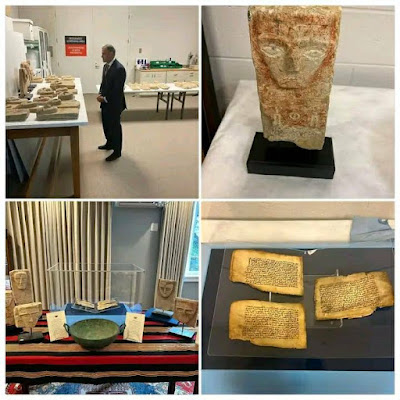On February 21, 2023 the United States restituted 77 looted artefacts to the Republic of Yemen via its Embassy in Washington DC. This marks the first time in nineteen years that the US has restituted material to that country, the last being a single funerary stela in 2004.
Participating in the ceremonial handover were Yemeni Ambassador Mohammed Al-Hadhrami, the U.S. Attorney’s Office for the Eastern District of New York, Steve Francis, Acting Executive Associate Director, HSI at the U.S. Department of Homeland Security (DHS), the U.S. Department of State, and representatives from the Smithsonian Institution.
According to the U.S. Attorney’s Office for the Eastern District of New York:
As alleged in the government’s forfeiture complaint, the 64 relief carved stone heads were smuggled into the United States from the United Arab Emirates with correspondence and invoices that contained multiple inconsistencies and were seized from the home and gallery of Khouli.
• Brooklyn-based antiquities dealer Mousa Khouli (aka Morris Khouli) of Windsor Antiquities,• Then-Michigan-based coin dealer Salem Alshdaifat of Holyland Numismatics,• UAE-based dealer Ayman Ramadan of Nefertiti Eastern Sculptures Trading, and,• a collector, Joseph A. Lewis, II, president and CEO of Pharma Management Corp.
According to the indictment, between October 2008 and November 2009 Khouli had arranged for the purchase and smuggling of a series of Egyptian antiquities into the United States from Dubai, specifically a set of Egyptian funerary boats, a Greco-Roman style Egyptian coffin, a three-part nesting coffin that once contained an ancient Egyptian named Shesepamuntayesher, and some Egyptian limestone figurines.
All of the aforementioned Egyptian artefacts mentioned in this article were recovered during a joint investigation conducted by the U.S. Immigration and Customs Enforcement's Homeland Security Investigations, and U.S. Customs and Border Protection. Some of the artefacts had been seized at the Port of Newark, New Jersey, the garage of Khouli's Brooklyn, New York, residence, his New York gallery, and during the search of co-defendant Joseph A. Lewis II’s residence.
Mousa Khouli is a dealer ARCA has written about on this blog in the past. He continues to do business in New York, though now under the business name of Palmyra Heritage Gallery. In 2016, we wrote about another suspect artefact handled by this Brooklyn dealer, a c. 3rd-5th century CE Palmyrene funerary head of a woman. Despite being Syrian in origin, it was sold with questionable Israeli paperwork and remains in circulation.




No comments:
Post a Comment